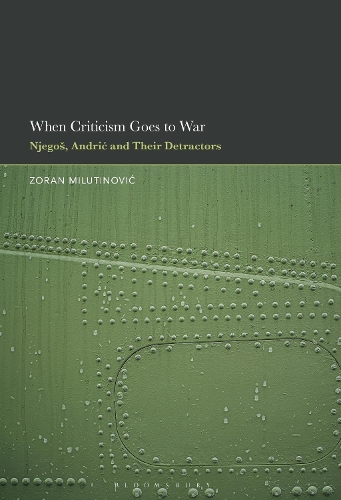
When Criticism Goes to War: Njegos, Andric and Their Detractors
(Hardback)
Publishing Details
When Criticism Goes to War: Njegos, Andric and Their Detractors
By (Author) Professor or Dr. Zoran Milutinovic
Bloomsbury Publishing USA
Bloomsbury Publishing USA
6th February 2025
United States
Classifications
Professional and Scholarly
Non Fiction
Literary studies: fiction, novelists and prose writers
Nationalism and nationalist ideologies and movements
891.82093581
Physical Properties
Hardback
168
Width 160mm, Height 232mm, Spine 16mm
340g
Description
A bold intervention into the lingering debates on Serbian writers Petar Petrovic Njegos and Ivo Andric in the late Yugoslav and post-Yugoslav period, which interrogates the political and moralizing (mis)use of literature. When Criticism Goes to War asks difficult questions about the relationship between literature, history, politics and ethics: Does representing something in fiction mean endorsing it Should fiction be used to rewrite history Should we weaponize legitimate ethical concerns while reading fiction and transform them into superficial moralizing Should political misreading of fiction be opposed Zoran Milutinovic examines a well-established, deeply rooted and widespread Bosniak nationalist discourse on Andric and, to a lesser extent, Njegos. This discourse claims that Nobel Prize winner Andric expounded a nationalist ideology in his works, which instigated, or at least justified, the genocide of Bosnian Muslims. Milutinovic argues that this Bosniak nationalist discourse is not really about Andrics works. It is a political discourse that uses Andrics works and career merely as a springboard, and as literary criticism and scholarship, it is harmful. This is criticism that goes to war. When Criticism Goes to War is a study characterized by a smooth and sensitive writing style that makes this contentious subject accessible to those more generally interested in political distortions of fiction and its authors, as similar attempts to misuse literature are not limited to the Yugoslav context.
Author Bio
Zoran Milutinovic is Professor of South Slav Literature and Modern Literary Theory at University College London, UK, and author or editor of 9 books, including The Rebirth of Area Studies (I.B. Tauris, 2020). He is also co-editor of the book series Balkan Studies Library and Member of Academia Europaea.
